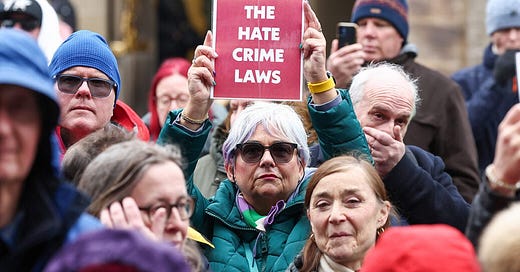Good afternoon. Today’s Morning Call Feature is by Finn McRedmond, a regular contributor of ours. Read on for a ferociously sane reaction to the recent introduction of SNP’s “hate crime” law. Morning Call readers can get 20 per cent off a yearly subscription today and tomorrow by clicking this button. Join hundreds of subscribers:
Existing New Statesman subscribers can read the piece here, or request complimentary access to Morning Call by replying to this message from the email on their account.
The town of Salem, Massachusetts, has become synonymous with the witch hunt, but between the 16th and 18th centuries the Scottish engaged in the persecution of witches at a rate far higher than their American counterparts. Thousands of women were tried, many burned and killed. A mode of censoriousness – and keen policing of the public realm – is written deep into the contours of Scottish history.
This historical episode is a simple explanation for how Scotland earned its reputation for vituperative puritanism. The introduction of the Hate Crime and Public Order Act on 1 April will do little to disabuse the world of this prejudice. The legislation criminalises “threatening or abusive behaviour” intended to stir “hatred” at certain groups, defined by age, disability, sexual orientation, religion and transgender identity. The bar for offence under the act is anything a “reasonable person would consider to be threatening or abusive”. Private conversations held in one’s home are fair game under the act.
Similar proposed legislation in Ireland has been set aside for now: the resignation of Leo Varadkar and more pressing anxieties on immigration have taken precedence. Now, the reception of the Hate Crime Act in Scotland might cause the government to abandon it altogether.
The disquiet at the new measures has been predictable: the Scottish broadcaster Andrew Neil proclaims the law an “Orwellian nightmare”; the Economist suggests it will have a “chilling effect on free speech”. There is general concern that the act will be vulnerable to malicious weaponisation by activist groups, and that it might overwhelm an already beleaguered and underperforming police force. The appointment of 500 so-called hate crime champions and the establishment of “third-party reporting centres” have a distinctly dystopian hum.
Defenders of the measures – namely its progenitors in the Scottish National Party – are insistent that this is mere overreaction to a well-intentioned law. The SNP leader Humza Yousaf has tried to mollify anxieties with the claim that the threshold for prosecution will be “very high”. The Scottish Victims and Community Safety Minister, Siobhian Brown, has offered her own reassurance: “You have to be really threatening and abusive” to be convicted of a crime, she said.
These woolly definitions of what constitutes “hate” do little to ease fears. Even if the rate of prosecutions is low, critics are unified: the mere existence of the legislation will create a climate of self-censorship and snitching, indirect penalisation of dissent and a flattened culture of one-note social liberalism. Exactly what this will mean for Scotland’s artistic production – not least the Edinburgh Festival Fringe – will soon be seen.
At the centre of the debate, as is so often the case, sits JK Rowling.
Keep reading with a 7-day free trial
Subscribe to Morning Call to keep reading this post and get 7 days of free access to the full post archives.






